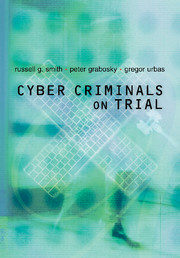Book contents
- Frontmatter
- Contents
- List of figures and tables
- Acknowledgments
- Preface
- Abbreviations
- Currency exchange rates
- Chapter One Introduction
- Chapter Two Defining and Measuring Cyber Crime
- Chapter Three The Prosecutor as Gatekeeper
- Chapter Four Cross-Border Issues
- Chapter Five Strategies of Cyber Crime Litigation
- Chapter Six The Quest for Harmonisation of Cyber Crime Laws
- Chapter Seven Judicial Punishment in Cyberspace
- Chapter Eight Sentencing Cyber Criminals
- Chapter Nine Conclusions
- References
- Appendix A Case Summaries 1972–2003
- Appendix B Selected Legislative Summaries
- Index
Chapter Six - The Quest for Harmonisation of Cyber Crime Laws
Published online by Cambridge University Press: 22 September 2009
- Frontmatter
- Contents
- List of figures and tables
- Acknowledgments
- Preface
- Abbreviations
- Currency exchange rates
- Chapter One Introduction
- Chapter Two Defining and Measuring Cyber Crime
- Chapter Three The Prosecutor as Gatekeeper
- Chapter Four Cross-Border Issues
- Chapter Five Strategies of Cyber Crime Litigation
- Chapter Six The Quest for Harmonisation of Cyber Crime Laws
- Chapter Seven Judicial Punishment in Cyberspace
- Chapter Eight Sentencing Cyber Criminals
- Chapter Nine Conclusions
- References
- Appendix A Case Summaries 1972–2003
- Appendix B Selected Legislative Summaries
- Index
Summary
The Need for Adequate Cyber Crime Laws
Cyber crime laws may be relative newcomers to the substantive criminal law of most jurisdictions, but their evolution has followed a more or less familiar path. The starting point has been the observation, whether driven by national or international experience, that certain harmful or potentially harmful behaviours appear to be beyond the reach of existing criminal laws. The identification of deficits in the criminal law may emerge from academic analysis or the work of law reform bodies, occasionally even a far-sighted legislature, but most often such problems show up first in prosecutorial failures. The inability to find appropriate charges to lay, or the failure or abandonment of criminal proceedings when it emerges that the criminal law does not in fact extend to the conduct alleged, indicate most clearly that a legislative gap may exist.
Few cases provide a better illustration than the infamous ‘Love Bug’ computer virus, discussed in Chapter Four. The inability of prosecutors in that case to obtain a conviction under the Access Devices Regulation Act prompted the Philippines legislature within weeks to introduce new laws relating to electronic commerce. From 15 June 2000, a penalty of six months to three years imprisonment applies to ‘hacking’, ‘cracking’ and computer virus offences in the Philippines, with fines ranging to a maximum commensurate to the damage incurred.
- Type
- Chapter
- Information
- Cyber Criminals on Trial , pp. 86 - 105Publisher: Cambridge University PressPrint publication year: 2004
- 1
- Cited by



